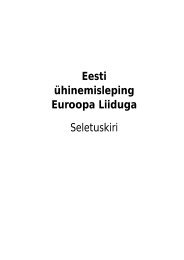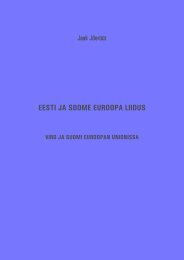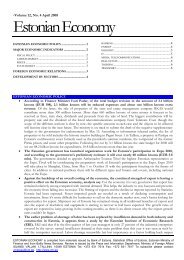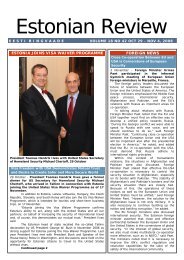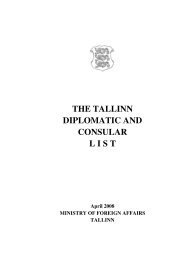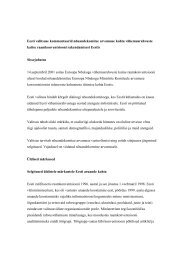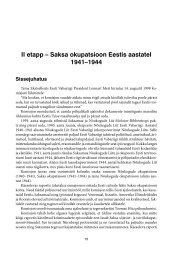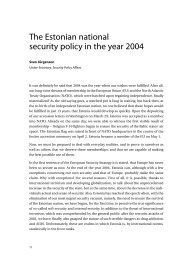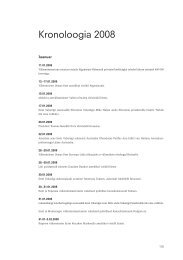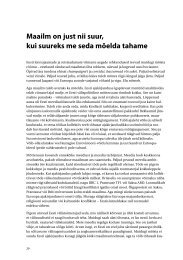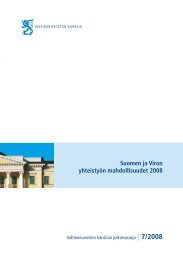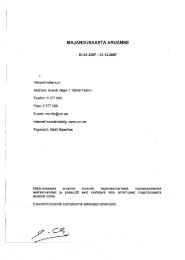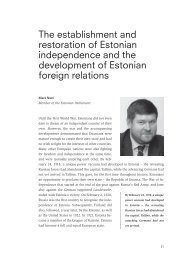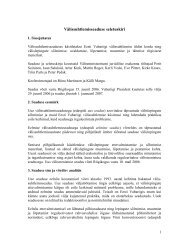Opportunities for Cooperation between Estonia and ... - Valitsus
Opportunities for Cooperation between Estonia and ... - Valitsus
Opportunities for Cooperation between Estonia and ... - Valitsus
You also want an ePaper? Increase the reach of your titles
YUMPU automatically turns print PDFs into web optimized ePapers that Google loves.
The Gulf of Finl<strong>and</strong> is one area of the Baltic Sea where many changes have<br />
taken places over the past few decades. The volume of shipping, particularly<br />
container <strong>and</strong> oil transports, has risen. Compared with the situation in 2000,<br />
exports from the EU countries to Russia have tripled <strong>and</strong> imports doubled.<br />
Almost 40% of this trade is carried via the Gulf of Finl<strong>and</strong>. Russia has stopped<br />
oil exports via the ports of Ventspils in Latvia <strong>and</strong> Butingen in Lithuania,<br />
meaning that even these transports are moved along the Gulf of Finl<strong>and</strong>.<br />
Of all the Baltic Rim countries, Finl<strong>and</strong> is the most dependant on the sea. Nearly<br />
85% of the country’s international goods are carried by sea. Every day, a total<br />
of 114 vessels either arrive or sail from Finnish ports. Almost half of this traffic<br />
runs through the Gulf of Finl<strong>and</strong>. Passenger numbers have also increased. In<br />
<strong>Estonia</strong>, carriage accounts <strong>for</strong> approximately 20% of all transports.<br />
It is estimated that the volume of goods transported in the Baltic Sea will grow<br />
by an average of 64% by 2020 while oil transports will increase at an even<br />
faster rate. Ever-larger freighters <strong>and</strong> tankers are being built to improve costefficiency,<br />
which makes it necessary to continuously exp<strong>and</strong> the ports h<strong>and</strong>ling<br />
international goods transports. According to the Technical Research Centre of<br />
Finl<strong>and</strong> VTT, the probability of an oil spill will be doubled by 2015.<br />
The risk is not limited to tankers filled to the brim with oil. All other vessels,<br />
such as freighters, ferries <strong>and</strong> cruisers, carry up to thous<strong>and</strong>s of tons of fuel<br />
<strong>for</strong> their own use. Aside from the increase in the volume of traffic, the poor<br />
technical condition of the craft or insufficient crew training may elevate the risk<br />
of marine accidents.<br />
Since the 1970s, the Baltic Marine Environment Protection Commission<br />
(HELCOM) has been the most important intergovernmental cooperation organ<br />
of the Baltic Rim countries. HELCOM brings together all the nine countries<br />
bordering on the Baltic Sea as well as the European Union. HELCOM is the<br />
governing body of the Convention on the Protection of the Marine Environment<br />
of the Baltic Sea <strong>and</strong> aims to promote a common policy <strong>for</strong> the protection of the<br />
Baltic Sea, disseminate environmental in<strong>for</strong>mation, issue recommendations <strong>for</strong><br />
improving the state of the sea <strong>and</strong> monitor the compliance with environmental<br />
st<strong>and</strong>ards by the member countries. In Krakow in November 2007, HELCOM<br />
adopted the Baltic Sea Action Plan outlining the following concrete objectives<br />
<strong>for</strong> substantially reducing the pollution of the Baltic Sea by 2021 by: preventing<br />
further eutrophication; preventing the release of hazardous substances;<br />
preserving biodiversity <strong>and</strong> controlling the environmental impact of maritime<br />
activities, <strong>and</strong> preventing damage.<br />
37



